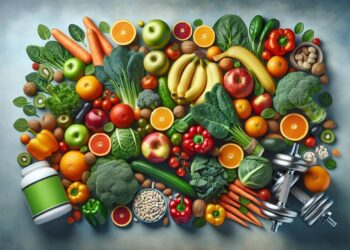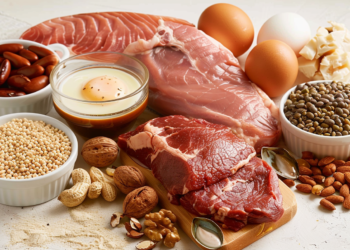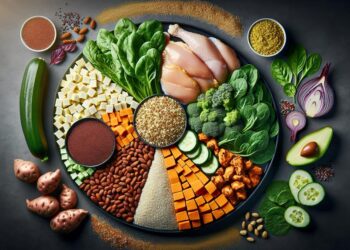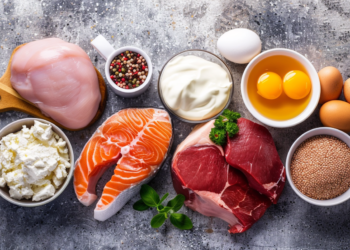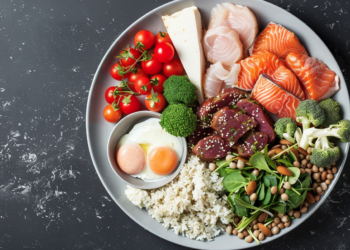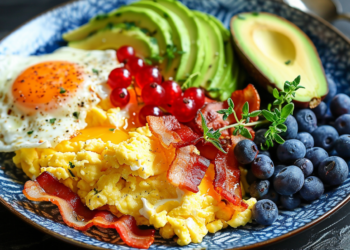Maximize your muscle gains with an effective meal plan that will revolutionize your bodybuilding journey.
Proper nutrition is vital for muscle building success. To kickstart your journey, focus on a well-balanced diet with protein, carbs, and fats. Pre and post-workout meals rich in protein and carbs fuel muscle growth. Spread meals evenly every 3-4 hours to keep nutrients flowing. Calculating your caloric needs using TDEE is essential. Lean proteins like chicken, complex carbs, and portion control are indispensable. Hydration and nutrient-dense snacks support muscle growth. Remember, consistency is key in your muscle-building meal plan.
Key Takeaways
- Balance protein and carbs for muscle growth.
- Include lean proteins like chicken and legumes.
- Timing meals pre and post-workout optimizes results.
- Hydrate adequately to support muscle function.
- Plan and prep nutrient-dense meals for consistency.
Importance of Proper Nutrition
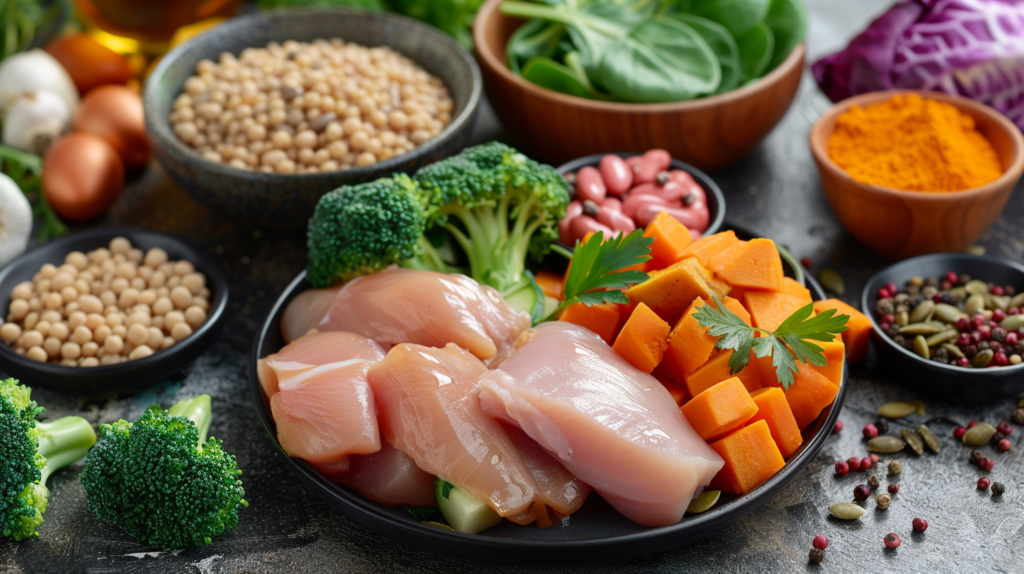
Proper nutrition plays an essential role in supporting muscle building and overall fitness goals. When it comes to maximizing muscle growth, paying attention to nutrient timing and meal frequency is key. Consuming a well-balanced diet with the right proportions of protein, carbohydrates, and fats is necessary for providing the body with the necessary fuel to repair and build muscle tissue.
Nutrient timing refers to the strategic intake of nutrients at specific times to optimize performance and recovery. Consuming protein and carbohydrates before and after workouts can help support muscle growth and replenish glycogen stores. It’s important to spread out your meals evenly throughout the day to ensure a steady supply of nutrients for muscle repair and growth. Aim to eat every 3-4 hours to keep your metabolism running efficiently and to prevent muscle breakdown.
While a nutritious diet should be the foundation of your muscle-building journey, some individuals may consider incorporating supplements to support their goals. However, it’s important to remember that supplements should complement a well-rounded diet and not replace real food. Additionally, be cautious of common diet myths and misconceptions surrounding supplements that promise unrealistic results. Focus on whole foods first and use supplements wisely to fill any nutritional gaps that you may have.
Calculating Your Caloric Needs

To determine your caloric needs accurately, it’s essential to calculate your Total Daily Energy Expenditure (TDEE) by considering factors such as your basal metabolic rate, physical activity level, and any specific goals you may have related to muscle building. Your TDEE represents the total number of calories your body needs on a daily basis to maintain your current weight. To support muscle growth, you generally need to consume more calories than your TDEE, creating a caloric surplus. This surplus provides the extra energy needed for muscle repair and growth.
When aiming to gain muscle mass, it’s vital to strike a balance between consuming enough calories to facilitate muscle growth and avoiding excessive weight gain. Monitoring your weight regularly can help you adjust your caloric intake accordingly. Remember, building muscle requires energy, and being in an energy balance or slight surplus is conducive to muscle growth.
Factors such as age, gender, weight, height, and activity level all play a role in determining your caloric needs. Online TDEE calculators can provide a starting point, but fine-tuning may be necessary based on how your body responds to changes in caloric intake. By understanding your caloric needs and adjusting your diet accordingly, you can optimize your muscle-building journey and work towards achieving your fitness goals efficiently.
Essential Macronutrients for Muscle Growth
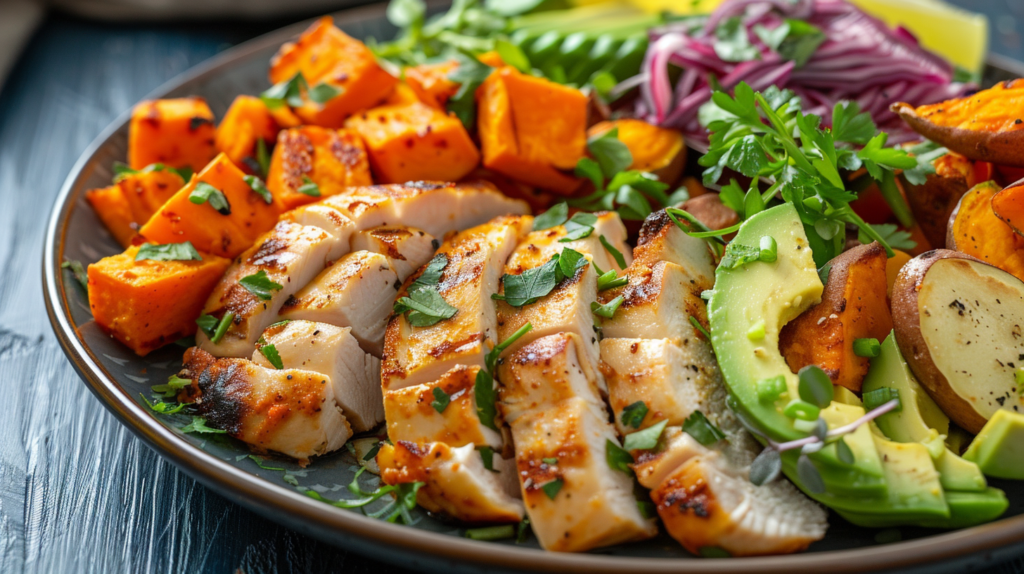
What key macronutrients are essential for facilitating muscle growth effectively?
When aiming to build muscle, it’s important to pay attention to your protein sources and carbohydrate choices. Proteins are the building blocks of muscle tissue, aiding in repair and growth. Opt for lean protein sources like chicken, turkey, fish, tofu, and legumes. These sources are rich in essential amino acids necessary for muscle repair and growth. Aim to include a variety of protein sources in your meals to make sure you’re getting all the essential nutrients.
In addition to proteins, carbohydrates play a significant role in fueling your workouts and supporting muscle growth. Opt for complex carbohydrates like whole grains, fruits, vegetables, and legumes. These carbohydrates provide a sustained release of energy, ensuring you have the fuel needed for your workouts and recovery. Carbohydrates are also important for replenishing muscle glycogen stores post-exercise, aiding in muscle recovery and growth.
Balancing your macronutrient intake is key to supporting muscle growth effectively. Aim to include a combination of lean protein sources and complex carbohydrates in each meal to provide your body with the nutrients it needs to build and repair muscle tissue. Remember, consistency is important when it comes to fueling your body for muscle growth.
Pre-Workout Meal Ideas

For peak performance during your workouts, choosing the appropriate pre-workout meals can greatly influence your energy levels and muscle readiness. To fuel your body efficiently before hitting the gym, opt for protein-packed snacks and energy-boosting meals. Protein is essential for muscle repair and growth, while carbohydrates provide the necessary energy to power through your workout. Here are some easy and nutritious pre-workout meal ideas to help you maximize your training sessions:
| Protein Packed Snacks | Energy Boosting Meals | Timing |
| Greek yogurt with almonds | Grilled chicken with quinoa | 1-2 hours before |
| Hard-boiled eggs with fruit | Turkey and avocado wrap | 2-3 hours before |
| Cottage cheese with berries | Salmon with sweet potato | 3-4 hours before |
Including a balance of protein, carbohydrates, and healthy fats in your pre-workout meals can enhance your performance, increase muscle protein synthesis, and improve recovery. Remember to drink plenty of water to stay hydrated and aid digestion. Experiment with different meal options to find what works best for your body and helps you feel energized during your workouts. By prioritizing your pre-workout nutrition, you set yourself up for success in the gym and on your muscle-building journey.
Post-Workout Nutrition Strategies
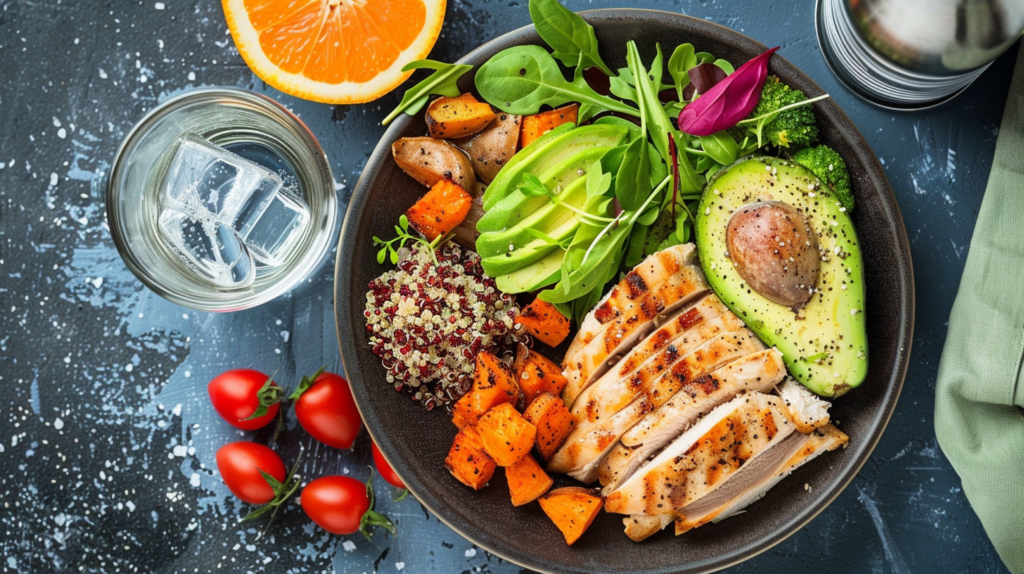
Have you ever wondered how to optimize your nutrition after a workout to support muscle recovery and growth effectively? Post-workout nutrition plays an important role in replenishing energy stores, repairing muscle tissue, and promoting muscle protein synthesis. Two key concepts to keep in mind are protein timing and nutrient timing to maximize your gains.
Protein timing is vital for muscle recovery. Consuming protein-rich foods or supplements within 30 minutes to an hour after your workout can help kickstart the muscle repair process. Aim for a combination of fast-digesting proteins like whey and slower-digesting proteins like casein to provide a sustained release of amino acids to your muscles.
Nutrient timing, specifically refueling strategies, is equally significant. After a workout, your body is in a prime state to absorb nutrients and replenish glycogen stores. Focus on consuming a balanced meal that includes carbohydrates to restore glycogen, proteins to aid in muscle repair, and fats for overall health. Including a variety of nutrient-dense foods like lean meats, whole grains, fruits, and vegetables can help you meet your post-workout nutritional needs effectively.
Healthy Snack Options for Muscle Building

When aiming to enhance muscle building, selecting nutritious snacks that are rich in protein and essential nutrients can be beneficial for supporting muscle recovery and growth. Protein-packed snacks are essential for muscle building as they provide the necessary amino acids needed for muscle repair and growth. Opting for muscle building munchies that are also rich in healthy fats and carbohydrates can further support energy levels and overall performance. Here are some healthy snack options to incorporate into your muscle-building meal plan:
| Snack Option | Benefits |
| Greek Yogurt with Berries | High in protein, calcium, and probiotics for gut health. |
| Almond Butter with Apple Slices | Provides healthy fats, protein, and fiber for sustained energy. |
| Mixed Nuts | Rich in protein, healthy fats, and micronutrients. |
These snacks are convenient, nutrient-dense options that can be easily included in your daily routine to support your muscle-building goals. Remember to choose snacks that align with your dietary preferences and goals, ensuring you are fueling your body with the nutrients it needs to thrive. By incorporating these protein-packed snacks into your diet, you can promote muscle recovery, support growth, and stay energized throughout your training sessions.
Hydration Tips for Optimal Performance

To maintain peak performance during muscle-building endeavors, adequate hydration is essential for supporting various bodily functions and enhancing overall workout efficiency. Water intake plays a vital role in muscle growth and recovery. Dehydration can lead to decreased strength, endurance, and focus during workouts, hindering progress. It’s important to consume water consistently throughout the day, not just during exercise sessions.
In addition to water, maintaining electrolyte balance is key for peak performance. Electrolytes, such as sodium, potassium, and magnesium, help regulate muscle function, nerve signaling, and fluid balance. During intense workouts, electrolytes are lost through sweat and need to be replenished to prevent cramps, fatigue, and muscle weakness. Consuming electrolyte-rich beverages or snacks can help support hydration and performance.
Monitoring hydration status is essential for muscle building. Thirst is a late indicator of dehydration, so it’s important to drink water regularly even if you don’t feel thirsty. A general guideline is to aim for at least 8-10 glasses of water per day, but individual needs may vary based on factors like activity level, climate, and body size. Incorporating hydration into your daily routine and being mindful of electrolyte intake can have a significant impact on your muscle-building journey and overall physical performance.
Meal Prep and Planning Tips

Proper meal prep and planning are vital components of a successful muscle-building journey, ensuring that nutritional needs are met consistently for best progress and performance. When it comes to grocery shopping, focus on whole foods like lean proteins, complex carbohydrates, healthy fats, and plenty of fruits and vegetables. Opt for nutrient-dense options that will fuel your workouts and support muscle growth. Planning your meals in advance can help you stay on track with your nutrition goals.
Portion control is essential for managing caloric intake and ensuring you’re getting the right balance of macronutrients. Use measuring cups, a food scale, or visual cues to help you portion out your meals correctly. Dividing your plate into sections for protein, carbs, and fats can also aid in creating balanced meals that support muscle building.
Consider prepping your meals in bulk to save time during the week. Cook large batches of proteins, grains, and vegetables that you can easily portion out into containers for grab-and-go convenience. This can prevent impulsive eating choices and keep you from veering off course with your nutrition plan. By taking the time to plan and prep your meals, you set yourself up for success on your muscle-building journey.
Frequently Asked Questions
Can Supplements Replace Whole Food Sources for Muscle Building?
Supplements can enhance muscle gains but should not replace whole foods. Dietary balance is important for best results. Whole foods offer essential nutrients and fiber that supplements may lack. Combining both can maximize muscle-building potential.
Is It Necessary to Track Micronutrients for Muscle Growth?
Tracking micronutrients for muscle growth is essential. Nutrient timing impacts performance. Understanding digestion process aids absorption. Skipping this step may hinder progress. We prioritize precision in our diet to optimize gains and overall health.
How Often Should I Change My Meal Plan for Optimal Results?
Changing your meal plan every 4-6 weeks optimizes results. Varying meal timing and nutritional profile supports muscle growth. Cooking methods impact nutrient retention. Consider these factors for sustained progress and a well-rounded diet.
Can I Consume Alcohol While Following a Muscle-Building Meal Plan?
Yes, alcohol consumption can interfere with muscle recovery by impacting protein synthesis and hormonal balance. Restricting alcohol intake is advantageous for optimizing muscle-building results. Prioritizing recovery is crucial for muscle growth and overall well-being.
Are Cheat Meals Allowed in a Muscle-Building Diet?
Cheat meals can fit if balanced. Be mindful. Frequent indulgence may hinder goals. Timing-wise, post-workout cheat boosts morale, not muscle. Control is key. Understand the consequences. Strategize for benefits, not setbacks.
Conclusion
To sum up, adhering to a well-balanced muscle-building meal plan is crucial for beginners aiming to optimize their gains. By focusing on your caloric requirements, consuming the appropriate macronutrients, and providing your body with nourishing pre and post-workout meals, you can position yourself for success in the gym.
Keep in mind, meal preparation and strategizing are essential for staying on course with your nutrition objectives. So go ahead, nourish your muscles with the ultimate meal plan and witness them grow like never before!





